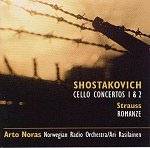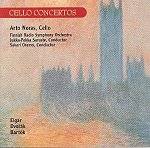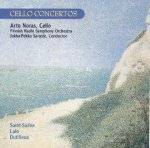Cello Concerto Collection Featuring Arto Noras (Cello) Finlandia
3984-26836-2
A box set of 3 CDs comprising:-
 |
Dmitri SHOSTAKOVICH
(1906-1975)
Concerto for Cello and Orchestra No.1 in E flat major
Concerto for Cello and Orchestra No.2 in G major
Richard STRAUSS
(1864-1949)
Romance in F for Cello and Orchestra
Norwegian Radio Symphony Orchestra conducted by Ari Rasilainen
FINLANDIA 3984-21441-2 [73:53] |
 |
Edward ELGAR
(1857-1934)
Cello Concerto in E minor
Antonín
DVORÁK (1841-1904)
Cello Concerto
Béla BARTÓK
(1881-1945) With Finnish Radio Symphony
Orchestra
Rhapsody No.1 (originally for violin and orchestra)
Conducted by Jukka-Pekka Saraste (Elgar and Bartók); and Sakari
Oramo (Dvorak)
FINLANDIA 3984 23394-2 [77:57] |
 |
Camille SAINT
SAËNS (1835-1921)
Cello Concerto No. 1 in A minor
Edouard LALO
(1823-1892)
Cello Concerto in D minor
Henri DUTILLEUX
(1916-)
Concerto for Cello and Orchestra (Tout un monde
lointain)
Finnish Radio Symphony Orchestra conducted by Jukka-Pekka
Saraste
FINLANDIA 3984-23395-2 [74:30] |
One is always a bit suspicious of bulk buying collections of concertos; there
is always a doubt of consistency of quality through the set no matter how
attractive the investment might appear. I can dispel these fears.
Art Noras (b. 1942) is the best-known Finnish cellist and has won numerous
prizes for his technically assured playing and his expressive readings. Nearly
all his recordings are found on the Finlandia label hence this collection.
The Elgar and Dvorák Concertos and the Bartók Rhapsody
Noras's recording of the Elgar Concerto joins the growing number of impressive
recordings now mounting up by non-British artists. This partnership with
Saraste results in a very appealing reading that strikes a happy balance
between the mellow and the passionately intense. Saraste is unafraid to go
out for the bombast of the fourth movement before returning the music smoothly
and elegantly into regret, tinged with tragedy, so assisting Noras to eloquently
breathe just the right amount of pathos into the closing pages.
I have heard more polished performances of Dvorák's popular Concerto
but this one has a fresh spontaneity about it. How lovingly Noras shapes
the lovely romantic tune at the heart of the opening movement and the equally
beautiful poignant melody of the Adagio. Oramo gives a strongly propelled
accompaniment with plenty of excitement and sensitivity as appropriate. The
very colourful Bartòk Rhapsody No. 1 (originally composed for violin
and orchestra) has two movements based on exotic and strongly rhythmic folk
material. Noras and Saraste deliver very appealing readings of music that
deserves far wider recognition.
The Saint-Saëns; Lalo and Duttilleux works
The Saint-Saëns Cello Concerto has been recorded many times and frankly
there are more polished versions. Noras affects a pleasing performance but
Saraste's accompaniment is a little coarse-grained and the finale really
too hurried. The lovely central minuet is appealing enough though. The Lalo
Concerto, which has a challenging part and a dominant role for the soloist,
fares better. This reading nicely balances the heroic bombast with the sweetly
romantic and the central Intermezzo is beguiling. Noras's playing is warmly
lyrical and technically secure.
But it is Duttilleux's Concerto for Cello and Orchestra - Tout un monde
lointain that is the really interesting work on this disc. Duttilleux's
very individual style is endlessly fascinating and strangely addictive; there
is always something to interest the ear - the kaleidoscopic nature of its
constantly shifting, scintillating patterns, weird glissandos, pointilliste
colourings etc. The title of the work, and of its five movements, are taken
from verse and prose of Baudelaire, from the metaphysical world of the decadents.
The opening 'Enigme' (Enigma) is sparkling and scherzo-like, 'Regard' (Gaze)
is, in contrast, introspective, inhabiting a strange, remote soundscape where
"poison…flows from your eyes…" Meditative, too is 'Mirroirs' (Mirrors)
- but the atmosphere is somewhat warmer. 'Houles' (Surges) is a vivid seascape
with the wind whipping the crests of the waves. 'Hymn' gathers together the
preceding material. A convincing performance.
Shostakovich Cello Concertos Nos. 1 and 2. Richard Strauss - Romanze.
Dmitri Shostakovich wrote his popular First Cello Concerto for Rostropovich
in 1959. The soloist occupies centre stage and is accompanied by a relatively
small orchestra with double woodwind and no brass except for one horn. The
opening movement is harsh and restless. Shostakovich suggested that it was
a "scherzo-like march." The second, slow movement is meditative and poignant
- a personal reflection that would surely have raised eyebrows if it had
been composed earlier? The third movement is entirely given over to the cadenza
with the soloist musing intensely over material already stated while the
finale has rather ponderous processional music that seems to have a rather
exotic oriental character and there are many timpani flourishes. Shostakovich's
Second Cello Concerto (1966) is understandably not as popular as his First,
for it is more subdued even reclusive but having said that it has an inner
glow and its quiet strength becomes more apparent on repeated listenings.
The solo part is not so flamboyant and the orchestral forces are quite modest
- although there is no lack of colour or interesting effects. The long opening
slow movement is dominated by expansive melodies broken up by sometimes quite
grotesque material. The two remaining movements are both marked Allegretto
the first of which is humorous and bitingly ironic with some sardonic cello
glissandi. The finale opens with horn fanfares that begin imposingly before
they are quickly satirised. The Cello enters and continues the satirical
statement over a shaking percussive instrumentation that puts one in mind
of an angry rattlesnake. The movement then turns tranquil and nocturne-like
and the movement proceeds to include music in many moods from the jerkingly
processional, through rather rustic dance figures to a danse macabre
culmination before an enigmatic concluding sequence coloured by imaginative
percussion. Noras is expressively poetic especially in the lovely Largo of
the Second Concerto and Rasilainen's accompaniment is colourfully articulate
in both concertos.
Richard Strauss's Romanza is an early work (1883 - some five years before
Don Juan) and it clearly shows the influence of Brahms, Schumann and
Mendelssohn. At this time Strauss was heeding his father's admonition to
ignore Wagner who Strauss Snr. passionately disliked! It is a gorgeously
melodic work and deserves to be better known. It was actually lost for many
years and did not surface again until 1986.
All in all, this is a box set that can be recommended - it might make an
ideal Christmas present for somebody beginning to explore the world of music
Reviewer
Ian Lace

